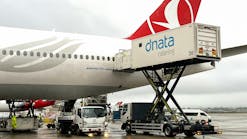Japan's Transportation Companies Seeking to Fill Void Left by Passengers with Freight
Railways, airlines and other transportation companies are bolstering their cargo sectors to address a plunge in the number of people traveling for pleasure, business and other reasons due to to the novel coronavirus pandemic. Alliances with a logistics industry facing serious labor shortages and seeking more efficient deliveries have also expanded. On September 10, East Japan Railway Co. began using bullet and express trains to transport local specialties and foods. The first shipment on a bullet train headed to Tokyo Station was of 10 boxes of grapes harvested in Suzaka, Nagano Prefecture. The cargo was stored in areas such those normally used for trollies for selling onboard items. Transport by train is often faster than by truck. Another advantage is less variation in arrival time. “Demand won’t go back to normal even when the pandemic ends,” said JR East President Yuji Fukasawa, who added the firm plans to seek contracts to ship items such as electronic components. According to Land, Infrastructure, Transport and Tourism Ministry, the number of passengers on the Tohoku, Joetsu and Hokuriku Shinkansen bullet train lines declined by 74 percent during the August holiday season compared to the same month last year. The 17 airlines with regular domestic routes are also facing a tough situation, with domestic passengers down 70 percent and international passengers down 97 percent in August. In June, Japan Airlines Co.’s low-cost carrier ZIPAIR Tokyo Inc. began carrying electronic components and detergent instead of people on its Narita-Bangkok route. The route was scheduled to go into service in May, but was delayed due to the novel coronavirus. The company was founded in 2018 but has yet to carry a single passenger. In the taxi industry, companies have started doing home deliveries by carrying food from restaurants in the trunks of their cars. Under a special ministry measure introduced in April, about 1,700 businesses have entered the market. Customers seem happy and all restrictions are expected to be lifted in October. Hiromi Suzuki, 54, president of Shida Kotsu in Fujieda, Shizuoka Prefecture, is planning on applying for a permit. “The number of passengers is only back to about 60 percent of a normal year. We have to create other revenue streams,” he said. The logistics industry, which is suffering from shortages of delivery and other workers, has started paying attention to means of transport that carry both people and cargo at the same time. In July, Yamato Transport Co. launched operations to carry both passengers and cargo, in collaboration with the Hachikan Bus company based in Gujo, Gifu Prefecture. Logistics companies hope such endeavors will reduce the burden on delivery workers, shorten delivery times and boost revenue to help bus companies maintain routes in depopulated areas.
———
©2020 the Asia News Network (Hamburg, Germany)
Visit the Asia News Network (Hamburg, Germany) at www.asianewsnet.net/home/
Distributed by Tribune Content Agency, LLC.




